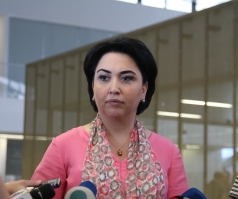
TBILISI, DFWatch–The human rights committee in Georgia’s parliament Thursday favored a law that would guarantee that at least 25% of representatives are women.
The law concerns those representatives who are elected through the proportional system, who account for half of the 150 seats, and would make it mandatory for parties to name women as half of their candidates on the party lists.
The proposal, which was put forth by a eight non-governmental organizations (NGOs), will make it mandatory for parties to make every second person on the list of candidates a woman. Six committee members supported the proposal.
The committee will now ask parliament’s bureau to consider the proposal. If parliament adopts the bill there will be at least 25 percent of women (38 seats) in parliament, as this will only affect proportionate lists, not the majoritarian seats.
The proposal was submitted in parliament in the beginning of summer and will amend the law on the political union of citizens. It was put forth by eight local NGOs, among which are the Georgian Young Lawyers’ Association, Women’s Information Cetner and Gender Justice.
Committee chairwoman Eka Beselia said the role of men and women in politics is special and having equal representation will have a positive effect.
“I hope that our future women colleagues will never have to go through the very difficult path through which our politician women went,” she said.
But the initiative also has some opponents. Gedevan Popkhadze from the committee thinks that it can be humiliating for women to get elected to parliament because of a quota.
He thinks that to look at the issue of rights there can be raised issues like ethnicity or other factors, which makes one person different from another and he for him having quotas based on such criteria is unacceptable. Only professionalism should be the criteria for choosing MPs.
“Neither of those young women, whose future we are discussing now, [will be met by] closed doors to the Georgian parliament,” he said on Thursday.
“I don’t think that parliament will improve by [having] quotas,” he continued, adding that the legislative assembly doesn’t have to be differentiated by ethnicity or sex.

